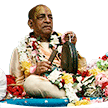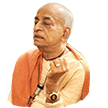Pure Consciousness - an essential subject: Difference between revisions
(Created page with "Category:Essential Subjects <!----------------------- edit below this line -----------------------> <!------------------------ begin introduction text below --------------...") |
(Vanibot #0041: Moves Choose Another box to the end) |
||
| Line 2: | Line 2: | ||
<!----------------------- edit below this line -----------------------> | <!----------------------- edit below this line -----------------------> | ||
<!------------------------ begin introduction text below ------------------------> | <!------------------------ begin introduction text below ------------------------> | ||
In the transcendental state the living being is pure in his consciousness, and as such he has no false ego to lord it over the material nature. Rather, his pure consciousness directs him to surrender unto the Supreme Lord, as stated in the Bhagavad-gītā (7.19): vāsudevaḥ sarvam iti sa mahātmā sudurlabhaḥ. All this indicates that in the transcendental state there is neither material creation nor the Causal Ocean for material nature. The above-mentioned state of affairs is factual on the transcendental plane, but is factually revealed in a transcendentalist's knowledge of the advanced state of pure consciousness. Such transcendentalists are of two types, namely the impersonalists and the devotees. | |||
Srila Prabhupada's books, lectures, conversations and letters offer a comprehensive presentation of this essential subject as seen in the Vaniquotes '''[[Vaniquotes:Category: | Srila Prabhupada's books, lectures, conversations and letters offer a comprehensive presentation of this essential subject as seen in the Vaniquotes '''[[Vaniquotes:Category:Pure Consciousness|Pure Consciousness]]''' category. An introduction from his books is given below in the following 10 quotes. | ||
<!-------- end introduction text and don't touch next three lines ---------> | <!-------- end introduction text and don't touch next three lines ---------> | ||
== Quotes from Srila Prabhupada's books == | == Quotes from Srila Prabhupada's books == | ||
<!----------------- edit quote boxes below this line -----------------> | <!----------------- edit quote boxes below this line -----------------> | ||
{{VaniQuotebox| | {{VaniQuotebox|Actually there is no bondage or misery for the living entity, nor does he ever lose his pure knowledge. In his pure consciousness, when he thinks seriously about his position, he can understand that he is eternally subordinate to the mercy of the Supreme|Actually there is no bondage or misery for the living entity, nor does he ever lose his pure knowledge. In his pure consciousness, when he thinks a little seriously about his position, he can understand that he is eternally subordinate to the mercy of the Supreme and that his attempt to become one with the Supreme Lord is a false illusion. Life after life the living entity falsely tries to lord it over material nature and become the lord of the material world, but there is no tangible result. At last, when frustrated, he gives up his material activities and tries to become one with the Lord and speculate with much jugglery of words, but without success. '''(Śrīmad-Bhāgavatam 3.7.10 )'''}} | ||
{{VaniQuotebox| | {{VaniQuotebox|As in clear, unagitated water, free from impurities, one can see everything clearly, so in pure consciousness, or Krsna consciousness, one can see things as they are|The more one becomes materially contaminated, however, the more consciousness becomes obscured. In pure consciousness one can perceive a slight reflection of the Supreme Personality of Godhead. As in clear, unagitated water, free from impurities, one can see everything clearly, so in pure consciousness, or Kṛṣṇa consciousness, one can see things as they are. '''(Śrīmad-Bhāgavatam 3.26.22)'''}} | ||
{{VaniQuotebox| | {{VaniQuotebox|As long as the child is within the womb of his mother, he is in a very precarious and horrible condition of life, but the benefit is that he revives pure consciousness of his relationship with the Supreme Lord and prays for deliverance|As long as the child is within the womb of his mother, he is in a very precarious and horrible condition of life, but the benefit is that he revives pure consciousness of his relationship with the Supreme Lord and prays for deliverance. But once he is outside the abdomen, when a child is born, māyā, or the illusory energy, is so strong that he is immediately overpowered into considering his body to be his self. Māyā means "illusion," or that which is actually not. In the material world, everyone is identifying with his body. '''(Śrīmad-Bhāgavatam 3.31.20)'''}} | ||
{{VaniQuotebox| | {{VaniQuotebox|As long as the living entity is trying to master material nature, there is no possibility of his becoming servant of the Supreme. Service to the Lord is rendered in pure consciousness of one's spiritual identity|In the material conception, one falsely thinks himself the lord of all he surveys, and therefore he is always troubled by the threefold miseries of life. But as soon as one comes to know his real position as transcendental servant, he at once becomes free from all miseries. As long as the living entity is trying to master material nature, there is no possibility of his becoming servant of the Supreme. Service to the Lord is rendered in pure consciousness of one's spiritual identity; by service one is immediately freed from material encumbrances. '''(Śrīmad-Bhāgavatam 1.1.2)'''}} | ||
{{VaniQuotebox| | {{VaniQuotebox|Atmavan especially means that one should be self-possessed. He should always remain in the pure consciousness that he is spirit soul and not the material body or the mind. That will make him progress confidently in Krsna consciousness|A devotee should always remain ātmavān, or situated in his spiritual position. He should not forget that his main concern is to make advancement in spiritual consciousness, or Kṛṣṇa consciousness, and he should not ignorantly identify himself with the body or the mind. Ātmā means the body or the mind, but here the word ātmavān especially means that one should be self-possessed. He should always remain in the pure consciousness that he is spirit soul and not the material body or the mind. That will make him progress confidently in Kṛṣṇa consciousness. '''(Śrīmad-Bhāgavatam 3.27.8)'''}} | ||
{{VaniQuotebox| | {{VaniQuotebox|In the transcendental state the living being is pure in his consciousness, and as such he has no false ego to lord it over the material nature. Rather, his pure consciousness directs him to surrender unto the Supreme Lord|In the transcendental state the living being is pure in his consciousness, and as such he has no false ego to lord it over the material nature. Rather, his pure consciousness directs him to surrender unto the Supreme Lord, as stated in the Bhagavad-gītā (7.19): vāsudevaḥ sarvam iti sa mahātmā sudurlabhaḥ. All this indicates that in the transcendental state there is neither material creation nor the Causal Ocean for material nature. '''(Śrīmad-Bhāgavatam 2.2.17)'''}} | ||
{{VaniQuotebox| | {{VaniQuotebox|It is the constitutional position of the living entity to be situated in this pure consciousness. Any so-called religious process that interferes with this unadulterated spiritual position of the living being must therefore be considered pretentious| It is the constitutional position of the living entity to be situated in this pure consciousness. Any so-called religious process that interferes with this unadulterated spiritual position of the living being must therefore be considered a pretentious process of religiosity. | ||
{{VaniQuotebox| | The real form of religion is spontaneous loving service to Godhead. This relationship of the living being with the Absolute Personality of Godhead in service is eternal. The Personality of Godhead is described as vastu, or the Substance, and the living entities are described as vāstavas, or the innumerable samples of the Substance in relative existence. '''(Caitanya-caritāmṛta, Ādi-līlā 1.91)'''}} | ||
{{VaniQuotebox|Pure consciousness can be revived by the process of sacrifice, charity, pious activities, etc., but when one pollutes his Krsna consciousness by offending a brahmana or a Vaisnava, it is very difficult to revive|One's pure intelligence, or pure Kṛṣṇa consciousness, becomes polluted by material activities. Pure consciousness can be revived by the process of sacrifice, charity, pious activities, etc., but when one pollutes his Kṛṣṇa consciousness by offending a brāhmaṇa or a Vaiṣṇava, it is very difficult to revive. Śrī Caitanya Mahāprabhu has described the vaiṣṇava-aparādha, or offense to a Vaiṣṇava, as "the mad elephant offense." One should be very careful not to offend a Vaiṣṇava or a brāhmaṇa. '''(Śrīmad-Bhāgavatam 4.26.24)'''}} | |||
{{VaniQuotebox|Pure self-realization is the pure consciousness of admitting oneself to be the eternal servitor of the Lord. Thus one is reinstated in his original position of transcendental loving service to the Lord|Pure self-realization, as we have several times discussed, is the pure consciousness of admitting oneself to be the eternal servitor of the Lord. Thus one is reinstated in his original position of transcendental loving service to the Lord, as will be clearly explained in the following verse. This stage of rendering transcendental loving service to the Lord without any hopes of emolument from the Lord, or any other way, can be attained when the material senses are purified and the original pure state of the senses is revived. '''(Śrīmad-Bhāgavatam 2.2.30)'''}} | |||
{{VaniQuotebox|The mahat-tattva, or shadow of pure consciousness, is the germinating place of all creation. It is pure goodness with the slight addition of the material mode of passion, and therefore activity is generated from this point|In due course of time, the impregnated material energy was manifested first as the total material ingredients. Everything takes its own time to fructify, and therefore the word kāla-coditāt, "influenced by time," is used herein. The mahat-tattva is the total consciousness because a portion of it is represented in everyone as the intellect. The mahat-tattva is directly connected with the supreme consciousness of the Supreme Being, but still it appears as matter. The mahat-tattva, or shadow of pure consciousness, is the germinating place of all creation. It is pure goodness with the slight addition of the material mode of passion, and therefore activity is generated from this point. '''(Śrīmad-Bhāgavatam 3.5.27)'''}} | |||
<!----------------- edit quote boxes above this line -----------------> | <!----------------- edit quote boxes above this line -----------------> | ||
''' | '''Pure Consciousness - [[Vaniquotes:Category:Pure Consciousness|explore more within this category]]'''. | ||
{{EsentialSubjectTotal}} | |||
{{ | <div style="float:left;"> | ||
{{EssentialSubjectnav}} | |||
</div> | |||
__NOTOC__ | __NOTOC__ | ||
__NOEDITSECTION__ | __NOEDITSECTION__ | ||
Latest revision as of 17:15, 22 November 2020
In the transcendental state the living being is pure in his consciousness, and as such he has no false ego to lord it over the material nature. Rather, his pure consciousness directs him to surrender unto the Supreme Lord, as stated in the Bhagavad-gītā (7.19): vāsudevaḥ sarvam iti sa mahātmā sudurlabhaḥ. All this indicates that in the transcendental state there is neither material creation nor the Causal Ocean for material nature. The above-mentioned state of affairs is factual on the transcendental plane, but is factually revealed in a transcendentalist's knowledge of the advanced state of pure consciousness. Such transcendentalists are of two types, namely the impersonalists and the devotees.
Srila Prabhupada's books, lectures, conversations and letters offer a comprehensive presentation of this essential subject as seen in the Vaniquotes Pure Consciousness category. An introduction from his books is given below in the following 10 quotes.
Quotes from Srila Prabhupada's books
Pure Consciousness - explore more within this category.
Vanipedia has now over 903 introductory articles compiled from Srila Prabhupada's books under the series titled Essential Subjects. All these articles can be seen in the Table of Content on the right side of this article and also here in this Umbrella Category. Browse through them to relish the breadth and depth of Srila Prabhupada's teachings - There is a subject for everyone.








